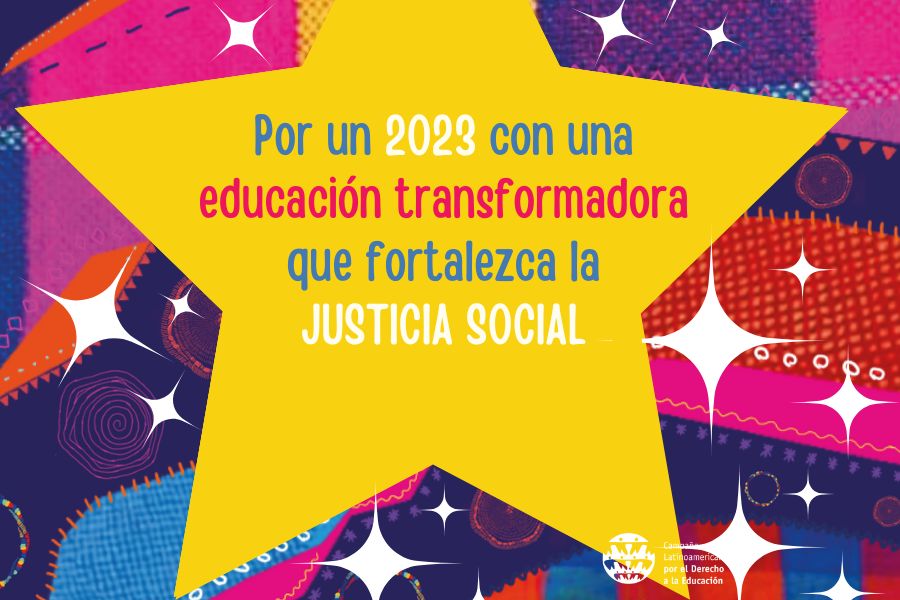
Happy Holidays! For a 2023 with a transformative public education
December 22, 2022Throughout this year we walked together to strengthen the human rights to education in Latin America and the Caribbean.
There were many issues and actions developed by our network.
This 2023 from CLADE we hope to share with more strength and union the path towards social justice from a public education which has care and transformation as its pillars.
Happy Holidays!
powered by Advanced iFrame. Get the Pro version on CodeCanyon.
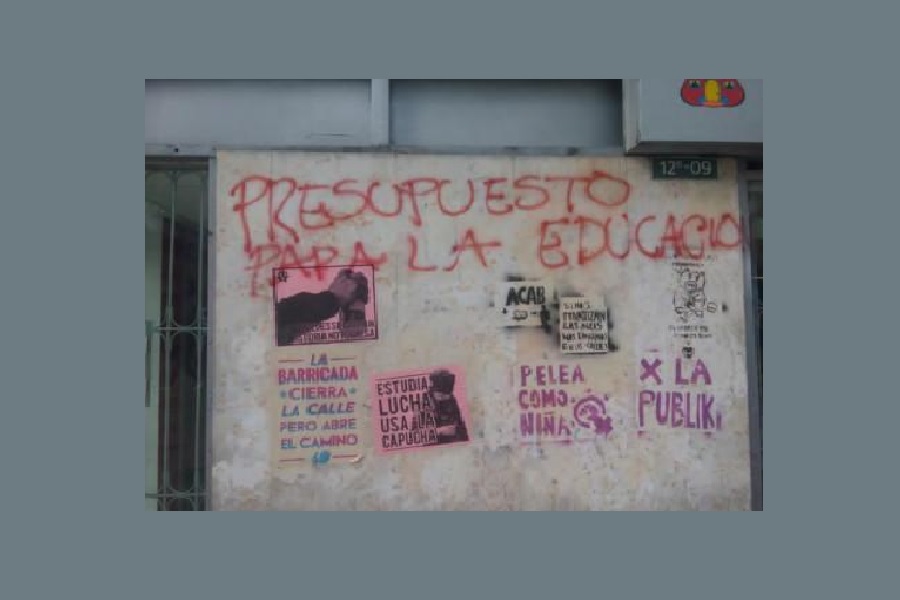
Action to End the Education Financing Crisis
February 12, 2021Article published in ALAI’s magazine No. 551: Derecho Humano a la Educación: horizontes y sentidos en la post pandemia 10/12/2020
1. Introduction
The right to education has been strongly asserted and embedded in human rights treaties for decades. Global leaders have also made bold political commitments to Education For All (EFA) first in Jomtien in 1990,i reiterated in Dakar in 2000 and reformulated as Sustainable Development Goal (SDG) 4 in Incheon in 2015.ii But the right to education is routinely violated, with over 61 million primary-aged children out of school, a further 60 million out of lower secondary schooliii and an alarming 250 million children estimated to be in school but failing to learn. This article argues that the root cause of that failure is that grand commitments and declarations have not been matched by financial resources. Indeed, many of these commitments have been made during the decades when neoliberal economic thinking has been in the ascendancy, enforced around the world by the IMF and World Bank, whether through their loan conditions or coercive policy advice. Indeed, public education systems in most countries have been chronically underfunded for forty years.
The scale of the education financing crisis is being laid bare and exacerbated by Covid-19. At the height of the pandemic 1.5 billion children were forced out of school and it is unclear how many of them will be able to safely return. It is likely that millions of girls will not return to school owing to early pregnancy, early marriage or gender-based violence. It is equally likely that children who do return will find their schools with even greater resource shortages than ever. UNESCO estimates at least $210 billion will be cut from education budgets next year simply owing to declines in GDP. Pressure on governments to reallocate scarce resources to health might cut a further 5% from education budgets amounting to a total loss of $337 billion in education spending. Education systems that have already been underfunded for generations, may well face their most severe financing crisis in the next three years.
Thankfully, this bleak scenario is not a certainty. The Covid crisis could instead mark a turning point, with a renewed commitment to expanded financing of public education and other essential services. The solutions are clear but whether they are adopted depends on mobilising sufficient political will to seize this moment.
2. Action on Debt
An immediate first step has to involve action on debt. There was a new debt crisis emerging well before Covid came along. An increasing number of countries have been spending more on debt servicing than on education or on health. ActionAid’s research with the Jubilee Debt Campaign, published in April 2020, studied 60 countries, finding that the 30 countries with the highest debt servicing (over 12% of their national budget) had cut spending on public services by 6% in recent years. In contrast, those countries with debt servicing under 12% of their budgets, increased public spending by 14%. The link could not be clearer.
The latest Global Sovereign Debt Monitor has determined that 122 of 154 countries analysed should be considered “critically indebted.”iv According to UNCTAD, in 2020 and 2021 alone developing countries will be forced to hand over up to $1 trillion in external debt payments, money that is desperately needed for education and other frontline services. In the light of Covid various efforts have been made by the G20 and others to suspend debt payments for low income countries. This acknowledges the problem but fails to offer a viable solution as it does not reach all the countries needing help, does not address all the debt that they owe (including to private banks and China) and crucially only suspends payments for a short period. There is now a growing demand for full debt cancellation. This would have a transformative effect because it would give countries instant access to revenue that is already in their treasuries, enabling them to use that for a comprehensive response to Covid. Rather than paying back old debts, countries could spend their revenue on health, education and social protection.
In the longer term there is also a case for a new debt compact – between creditors and debtors – to ensure that all new loans are taken out based on a clear and transparent process, with proper democratic oversight. Loans can play an important role in enabling countries to invest in their development, but no country should ever find itself having to sacrifice crucial development goals I order to pay back old debts.
3. Action on Tax
Most education advocates have long focused on the share of the national budget spent on education – using the benchmark of 20% as an indicator of good practice. However, a fair share of a small pie is a small amount. By focusing almost exclusively on the share of the budget, education advocates have failed to pay sufficient attention to the overall size of government budgets – which is determined more than anything else by tax revenue.
Currently, tax revenues in low- and middle-income countries fall short of what is needed to guarantee universal quality public services. The average tax-to-GDP ratio in OECD countries is 33% of GDP in taxation with Scandinavian countries often having a ratio of over 40%. Lower middle-income countries average about 24% and low-income countries have an average tax to GDP ratio of just 16%. The countries with the lowest tax to GDP ratios – Pakistan and Nigeria – are also home to the largest numbers of out-of-school children. This is not purse coincidence. If a government does not collect sufficient tax revenue it is like a ‘regalian state’ (Thomas Piketty’s term), having the ceremonial appearance of a state but not in a position to deliver on its obligations to be a ‘social state’.
The IMF estimates that most countries could raise their tax-to GDP ratio by 5% in the coming years, so that the average low income country could rise from 16% to 21% – putting them in a position to dramatically increase social spending. ActionAid’s research showed that such increases could be delivered through Progressive Tax reforms ensuring that those who have more, pay more. This could be achieved through action on harmful tax incentives (through which countries lose $138 billion a year), aggressive tax avoidance (through which countries loose $500billion a year) , property, land and wealth taxes, carbon taxes, corporate income tax and digital taxes.
One of the great advantages of focus on tax reform is that this enables education advocates to find common ground with health activists, water and sanitation or social protection advocates. If we focus only on the share of the budget for education we are in competition with other sectors, but focusing on the size of the overall budget makes us allies. The table below shows what a 5% increase in tax to GDP ratio would mean for public services in a selection of countries:
| Country | Extra revenue in 2023 with 5% increase (compared to 2017) |
Could double budgets from current levels across social sectors… | …and still be left with |
| Afghanistan | $ 1.5bn | Education, health and social protection | $371m |
| Bangladesh | $32bn | Education, health and social protection | $ 17bn |
| Benin | $1.3bn | Education, health, social protection &WASH | $556m |
| Burkina Faso | $1.8bn | Education and health | $410m |
| Central African Rep | $172m | Education, health and WASH | $70m |
| Colombia | $30.8bn | Education, health and social protection | $3m |
| Congo, Rep | $1.9bn | Education, health and social protection | $1m |
| DRC | $8.2bn | Education, health, social protection &WASH | $6m |
| Ecuador | $6.3bn | Educationπ | $963m |
| Ethiopia | $11.6bn | Education, health and WASH | $5.89bn |
| Gambia, The | $156m | Education and health | $19.9m |
| Ghana | $7.8bn | Education, health, social protection & WASH | $3bn |
| Guatemala | $6.2bn | Education, health and WASH | $2.7m |
| Jamaica | $1.2bn | Health, social protection and WASH | $218m |
| Jordan | $3.2bn | Education, health and WASH | $2.8m |
| Kenya
|
$10bn | Education, health, social protection & WASH | $3.8m |
| Lesotho | $283m | Education∑ | $62m |
| Madagascar | $1.2bn | Education, health, social protection & WASH | $547.4m |
| Malawi | $732m | Education, health, and social protection | $97.6m |
| Mali | $1.8bn | Education, health, social protection & WASH | $620m |
| Mozambique | $1.3bn | Education and health | $0Ω |
| Nepal | $4.4bn | Education, health, and social protection | $2.3bn |
| Niger | $979m | Education, health, social protection & WASH | $121.6m |
| Rwanda | $1.3bn | Education, health, social protection &WASH | $697.5m |
| Senegal | $7.6bn | Education, health, social protection & WASH | $5bn |
| Sierra Leone | $380m | Education, health, social protection & WASH | $56.2m |
| South Africa | $27.9bn | Education | $3.5bn |
| Tanzania | $6.4bn | Education, health, social protection & WASH | $3.3m |
| Togo | $598mn | Education, health and WASH | $201.5m |
| Uganda | $3.1bn | Education, health, social protection & WASH | $1.5bn |
| Zambia |
$6.2bn |
Education, health, social protection &WASH | $3.7bn |
From https://actionaid.org/publications/2020/who-cares-future-finance-gender-responsive-public-services
ActionAid’s most recent research in this area looked at the amount of revenue that could be raise from just 3 big tech companies. If simple global reforms were made a selection of 20 countries could raise $2.8 billion between them from Facebook, Microsoft and Google. That could pay for 879,000 new teachers – who between them could transform education in each of the countries
4. Action on Austerity and Public Sector Wage Bills
Reducing debt servicing and expanding tax revenues could transform the resources available for education and other public services. But not in you are not allowed to spend the revenue you raise owing to coercive policy advice and loan conditions from the IMF which insist on austerity. In ActionAid’s 2020 report Who Cares for the Future: finance gender-responsive public services! one of the most startling statistics revealed that in 78% of low-income countries1, the IMF had advised countries to cut or freeze public sector wage bills in the previous three years. This has a particularly devastating impact on education as teachers are the largest groups on most public sector wage bills – so you cannot realistically recruit more teachers or pay teachers more if you have an overall limit. So, despite desperate shortages of teachers in many countries, Ministries of Finance have their hands tied by the IMF. This directly impacts any attempt to increase overall spending on education as teachers are often 90% of the education budget.
Revisiting this research six months later, in October 2020, the policy briefing The Pandemic and the Public Sector showed that although the IMF was being apparently generous in giving out emergency loans and allowing increase in health spending, they were also forecasting a rapid return to ‘fiscal consolidation’ – which is the IMF term for austerity. Indeed, most countries receiving emergency loans for Covid health responses were required to make clear commitments to revert to austerity within the coming year.
The root cause of the problem is that the IMF continues to see public sector wage spending as a problem rather than a solution. Nowhere is this better illustrated than in the fact, that the IMF does not consider the wages of public employees working in public services or other “pro-development” pursuits to be development spending; that designation is reserved for infrastructure such as schools and books for education, or hospitals, lab equipment and medication for health. If the significance of trained, quality workers for those areas were so recognized, it would be subject to “social spending floors,” which the IMF should, by its own guidelines, not recommend freezing or cutting.
Our latest research reinforces the case for a comprehensive evaluation of the IMF’s approach to public sector workers and public sector wage bills. There is a strong case for arguing that Covid-19 is the right moment for a fundamental re-think by the IMF, the time to move away from past policies, norms and practices which have left so many countries so ill-prepared for this health and economic crisis. Recognising that we are also facing a climate crisis increases the pressure for change – reframing how development is understood and moving beyond the narrow measure of GDP growth to factor in progress on human rights and development goals as integral to any economic measurement. And if the IMF does not embrace change then it is time for citizens everywhere to pressure their governments and international institutions to resist neoliberal dogma and adopt social and economic policies that value and care for both people and the planet.
5. Action on Increasing 4Ss
Whenever we argue for action on tax and debt and austerity a common response is that there is no point giving more money to governments because they can’t be trusted. Corruption is endemic and the money won’t end up improving public services in practice. Of course, we need to take this challenge seriously. There is corruption and mis-use of public resources (even though the bigger scandals are often in the private sector). We cannot just argue for more money for public education without a credible framework for how it should be spent. That is the logic behind the 4 S framework – which does not translate so easily into Spanish! This concerns the size of the budget overall, the share spent on education, the sensitivity of allocations and the scrutiny of spending in practice:
Increasing the share of the budget to education – as referenced above there is a well-established benchmark calling for governments to spend 20% of budgets on education. Tracking what share a government spends is a critical part of the bigger picture – but not enough on its own.
Increasing the overall size of government budgets – as outlined this is determined mostly by the tax revenue collected. However, it is also influenced by the macro-economic policies followed and by the level of debt
Increasing the sensitivity of the budget to policy priorities – some governments invest a disproportionate percentage of their education budget to benefit a small (but powerful and vocal) elite who access higher education. A more progressive and sensitive approach involves targeting spending to re-dress disadvantage. Pasi Sahlberg from Harvard University shows that countries who invest sensitively to make their education systems more equitable make significant progress in improving overall learning achievement.
Increasing the scrutiny of the budget – perhaps most important of all is that we need to ensure that there is independent scrutiny of education budgets. If people are not confident that budgets allocated will be properly spent it is hard to advocate for more resources. There are many positive examples of national and local budget tracking, of community audit groups tracking school budgets and of budgets being posted on school walls to ensure full transparency. These are crucial for ensuring that governments are held to account by their own citizens (rather than feeling accountable to external donors).
6. A Concluding Call to Action
In September 2020, 190 organisations signed a Call to Action on Domestic Financing of Education post-covid which touched on many of the key points raised in this article. The focus on domestic financing is key – as 97% of revenue for education is raised domestically (see The Learning Generation, Education Commission report). Aid and loans are relatively marginal – but they can make a difference when they incentivise or leverage deeper domestic commitment. Rich countries should play their part and reversing the recent decline in aid is important. But that aid should not come with conditions driven by donor countries. They should support the strengthening of public education systems based on national priorities set by national governments in consultation with national civil society. Sadly the aid effectiveness agenda is in decline with donor countries now more concerned to protect and advance their own trade and security interests. In this context, large increases in aid seem highly unlikely, though we can hope to defend and even increase the funding for some key actors who still seek to harmonise efforts, such as the Global Partnership for Education. Beyond that the call to the international community might more usefully focus on calls for debt cancellation, for changes to global tax rules and for ending the neoliberal obsession with austerity that has done so much to damage education systems around the world. Raising more funds from the international community always seems tempting as a way to make things better – but the real challenge is to stop the international system from continuing to make matters worse.
– David Archer, Head of Public Services, ActionAid International – david.archer@actionaid.org
1 In a review of IMF country documents for 2019, we found that of 23 low income countries (covering all the LICs with sufficient data available), seven (30%) expected to cut wage bills, 11 (48%) were freezing wage bills. Only five (22%) planned to increase wage bills.
i UNESCO, World Declaration on Education for All, Jomtien, Thailand (1990), adopted by the World Conference on Education for All, Jomtien, on 9 March 1990, https://bice.org/app/uploads/2014/10/unesco_world_declaration_on_educati….
ii UNESCO, Education 2030: Incheon Declaration and Framework for Action for the implementation of Sustainable Development Goal 4: Ensure inclusive and equitable quality education and promote lifelong learning, UNESCO Doc. ED-2016/WS/28, 2016, https://unesdoc.unesco.org/ark:/48223/pf0000245656
iii UNESCO, GEM Report 2016, http://uis.unesco.org/en/news/263-million-children-and-youth-are-out-school. The impact of COVID-19 on school attendance is discussed below.
iv Jubilee Germany/Erlassjahr, Global Sovereign Debt Monitor 2019, p. 4. https://erlassjahr.de/wordpress/wp-content/uploads/2019/05/Global-Sovereign-Debt-Monitor-2019.pdf.
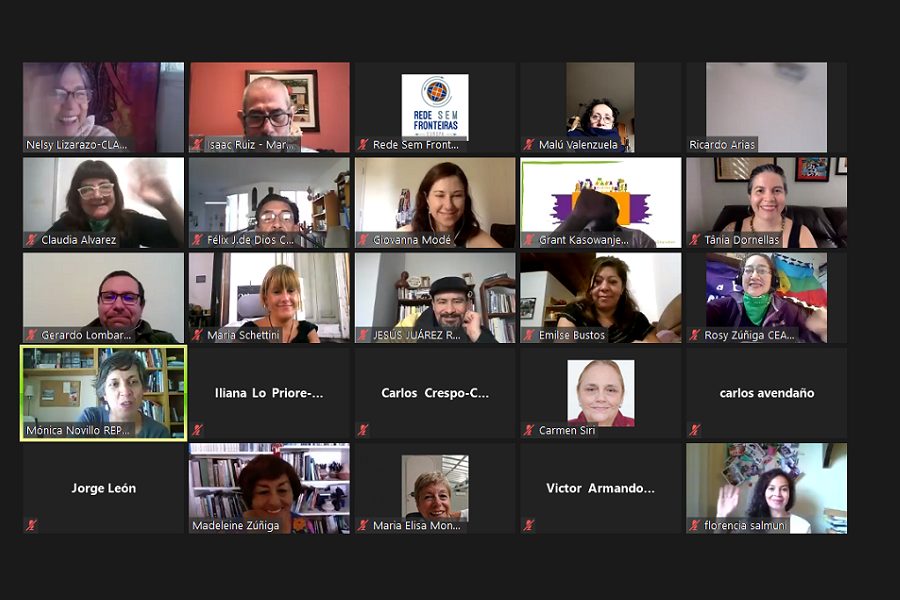
The Assembly “Towards a global agenda: the human right to education from the movements” took place at the World Social Forum 2021.
February 1, 2021With the participation of a hundred delegates from organizations that converge around education as a human right, the self-organized assembly “Towards a global agenda: the human right to education from the movements” was held this Saturday (30) in the framework of the World Social Forum (WSF) 2021.
The activity was organized by the Latin American Campaign for the Right to Education (CLADE), the Council for Popular Education in Latin America and the Caribbean (CEAAL), the Pressenza Agency, the Espacio sin Fronteras Network, the Global March against Child Labour, the Global/Local Network for Quality Education, the Popular Education Network of Women (REPEM), the World Organization for Early Childhood Education (Omep) and Fe y Alegría.
Opening the dialogue, Grant Kasowanjete, Global Coordinator of the Global Campaign for Education, highlighted the need to ensure increased funding for public education in the countries of the global South as one of the main challenges to realizing the human right to education.
She pointed out that “for every dollar of aid that arrives from the global North, ten dollars are taken away through foreign debt and other mechanisms”, which erodes public coffers and underfunds the system, since 90% of education budgets come from own resources.
Nelsy Lizarazo, from the general coordination of CLADE, emphasized the deepening as result of the pandemic, of pre-existing inequality gaps and a refinement of stratification and exclusion from the educational pathway in social sectors lacking support, connectivity or adequate equipment, highlighting rural populations, migrants, indigenous people and people with disabilities, among others.
At the same time, she indicated how governments have handed over millions of dollars and data to corporations, information that will feed the already enormous business of these technology multinationals. She also added that the emergency has meant a greater precariousness of the teaching condition with budget reductions, salary reductions, a heavier workload, to which is added the psychological pressure produced by the effort of educators to respond to and overcome the difficulties posed by the technological and pedagogical challenge of distance education.
On the basis of these characterizations, the question of the learning, strengths and challenges identified in this course was launched as a trigger.
In a first round of interventions, key aspects such as the lack of infrastructure and the need for community technological development independent of large corporate platforms, the damage caused by the exclusion of millions of children from the educational process or the dysfunctionality of homogeneous educational planning in the face of the complexity of diverse realities were pointed out.
Among the lessons learned, the imaginative capacity of the educators who managed to overcome adverse conditions, the propensity for knowledge of children beyond the institutional framework, the importance of dialogue and joint work between school, parents and community, the role of community education together with the favorable impact of progressive political projects in the face of the failure of the neoliberal system were valued.
The assembly continued its collective reflection on the priority agenda of the regions and what is common to these agendas.
In a fluid and propositional dialogue, the participants indicated that the struggle must lead first and foremost, in the face of the prevailing violence in different territories, to guaranteeing the right to life. Likewise, to overcome inequality at educational levels within the social system, to offer safe educational spaces, free of aggression and abuse for girls and boys, and to strengthen a new non-predatory social relationship.
The need to promote a political-pedagogical revolution in the face of neoliberal agendas was also pointed out, as well as the need to strengthen intergenerational dialogue, especially in relation to older adults and the importance of implementing Comprehensive Sex Education as a mechanism to overcome sexual violence against girls, adolescents and women in general.
On the other hand, global priorities included the struggle to ensure that the right to education is not minimized, the defense and strengthening of the public system and counteracting the fallacy that private systems are better, overcoming inequality and discrimination in education, and guaranteeing adequate funding for education from a human rights perspective.
When analyzing possible cross-cutting themes for common action, the indivisibility of human rights was emphasized and, consequently, it was proposed to promote broad alliances by interweaving struggles with the agendas of other rights while contributing to strengthening social organization and mobilization. The importance of continuing to generate knowledge by connecting it with messages and campaigns that mobilise demands was highlighted.
In the same way, a suggestion was made in the debate for a greater exchange on the modalities used to make good practices visible and to achieve effective impact in relation to the demands put forward.
Among the proposals for joint action, the creation of an observatory, the promotion of liberating education in the presence of Paulo Freire’s centenary, the opening of spaces for the expression of the new generations and the idea of Good Living were suggested. Political action is needed to rethink education in terms of feminism and socio-economic equity, and to articulate the forces to overcome not only the physical but also the mental illness from which humanity suffers.
Finally, the Assembly approved a text to be proposed and included in the final declaration of the World Social Forum 2021.
“In the framework of this WSF 2021, we join the agenda of transformation at the global level, articulated to the various fields of social struggle and rights, recognizing the catalytic role of education. The pandemic highlighted the historical inequalities within and outside education systems, affecting women, girls, people with disabilities, refugees and migrants, indigenous communities, rural populations, among others. It also highlighted the digital divide and government responses to it, as well as the need to build a digital sovereignty strategy.
Through strengthened public education systems, it is necessary to resist the threats of fiscal austerity policies, national indebtedness and cuts in education funding, as well as the multiple trends of privatization. From early childhood through to youth and guaranteeing adult education, it is essential, in the post-pandemic period, to rethink the meaning and purpose of education, in the search for the rights of peoples and overcoming patriarchy. A heterogeneous and intercultural model, transformative and inclusive; based on dialogue and safe for communities; valuing their knowledge and local knowledge, as well as collaboration in solidarity and commitment to the protection of life”.
Video:
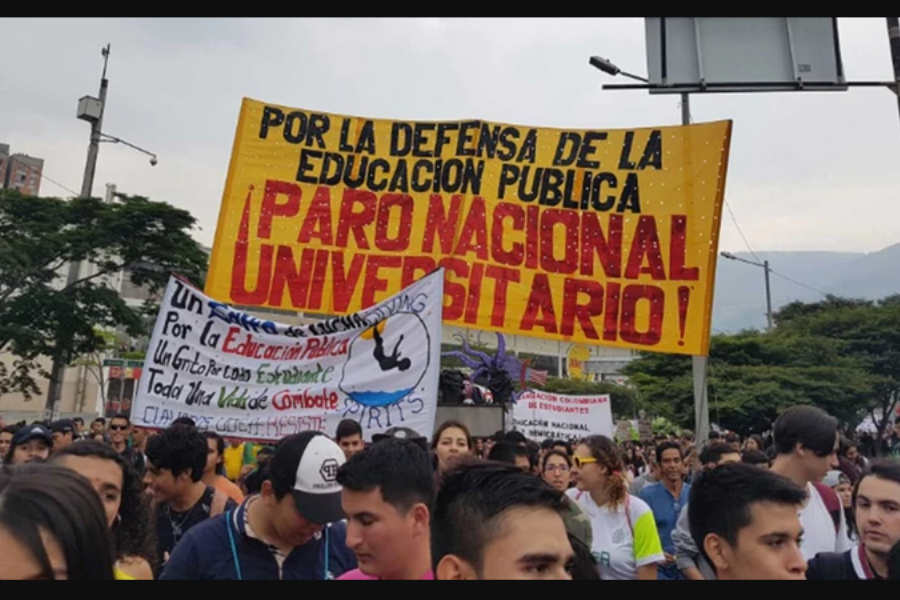
CIES 2020: None of the countries from Latin America and the Caribbean explicitly prohibit profit in education
May 12, 2020Chile, Haiti and Paraguay are three countries from Latin America and the Caribbean where legislations clearly lead to the generation of profit and privatization in and from education. At the same time, Argentina, Brazil, Colombia, Honduras, Mexico and Peru have legislations that allow for profit in education. These are some preliminary findings of the study on “Profit and education within legal frameworks in Latin America and the Caribbean” that the Latin American Campaign for the Right to Education (CLADE) is conducting.
Some of the conclusions of the research were presented by Teise Garcia, from the Research and Study Group on Education Policy (GREPPE, by its Spanish acronym) from Brazil, during the virtual panel: “Marketization and Profit in and from Education: Global and Regional Perspectives in Latin America and the Caribbean”. The debate was held within the framework of CIES 2020 on April 15.
“We did not find a full prohibition that explicitly prevents public incentives to profit in any of the countries of the region that were analyzed in this study. Only Argentina is worth mentioning because bilateral and multilateral agreements related to profit generation are prohibited”, stated Teise García.
Apart from the researcher, the panel was attended by the following participants: David Archer from ActionAid International; and Cecilia Gómez from the Colombian Coalition for the Right to Education, (CCDE, by its Spanish acronym). Camilla Croso, General Coordinator of CLADE, and Toni Verger, from the Autonomous University of Barcelona, were in charge of the debate and moderation, respectively.
The objective of the panel, organized by CLADE, was to promote reflections and dialogue on education privatization and profit processes in the region, as well as their negative impact on the realization of education as a human right for all.
powered by Advanced iFrame. Get the Pro version on CodeCanyon.
Lack of funding and creation of poverty
For David Archer, from ActionAid, the increase in education marketization and profit owes mainly to the lack of public funding for this right which is a problem that educators, activists and consultants should focus on.
Insufficient public education coverage, combined with a growing structural deficit in public education funding has paved the way for the emergence and consolidation of a for-profit private education market which seems to be increasingly the norm in the region”, he said.
He added that the reason for this lack of adequate funding for the right to education, in most cases, is the external debts of the countries and the absence of tax justice. “There is a new external debt crisis”. At this moment, there are 60 countries that allocate more than 12% of their Gross Domestic Product (GDP) to pay the external debt. This means that the payment of the debt exceeds the financing for education and health, which is absurd amidst the COVID-19 crisis that we are facing”, he pointed out.
According to Cecilia Gómez, lack of State funding for the realization of rights and, consequently, the privatization of public services, create poverty. “I think that this neoliberal model which in our countries results in privatization (of water, energy, education, etc.) creates extremely high poverty rates, impoverishment of people who are already poor and are now reaching misery levels”.
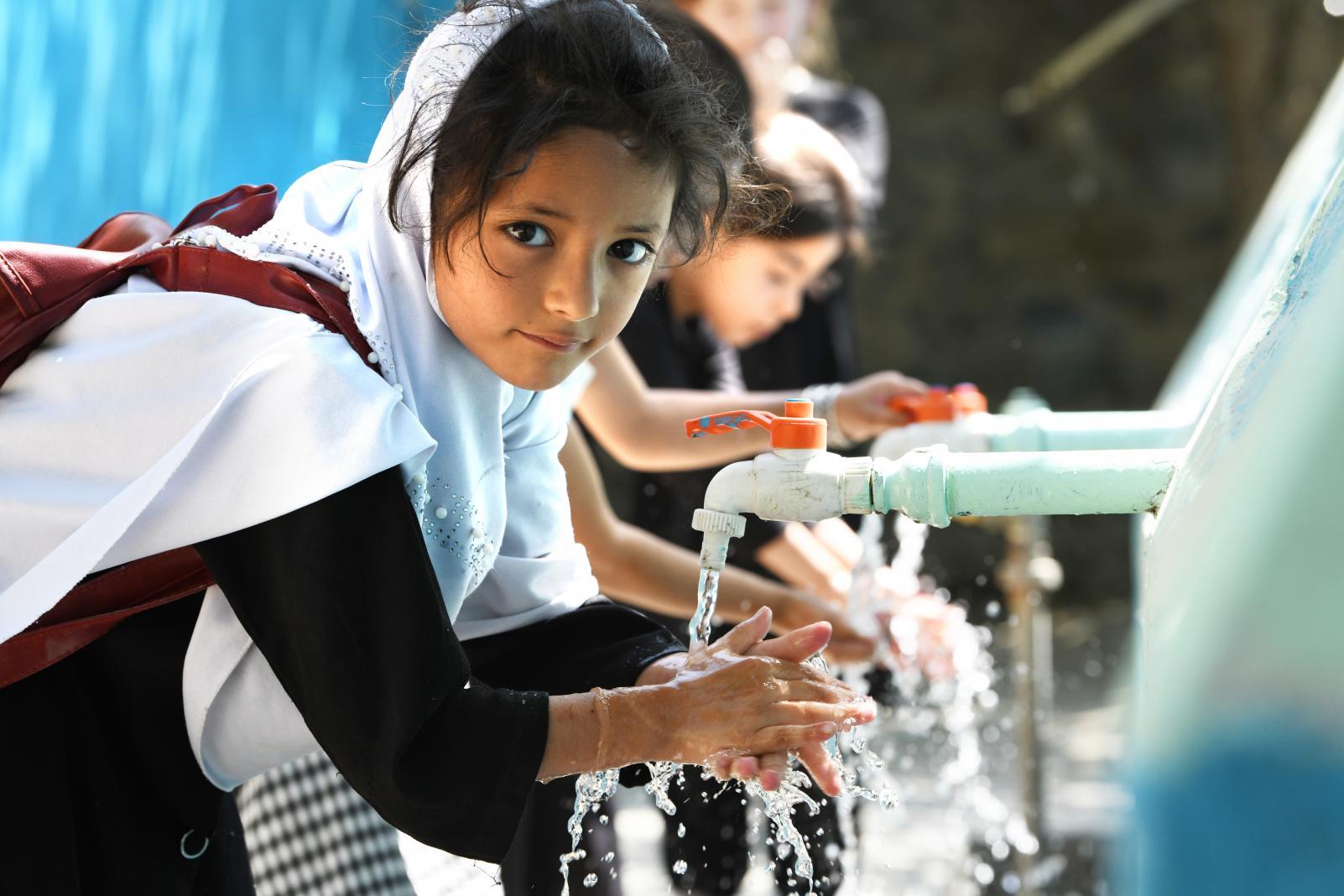
COVID-19: CLADE considers that solidarity and adequate funding for the rights to education, health, and social protection are key to overcome the crisis
March 25, 2020Considering the widespread crisis and state of emergency across the world due to the COVID-19 pandemia, CLADE acknowledges and appreciates the life and health prevention and care recommendations made by the World Health Organization. We would like to express our solidarity with families that have lost their loved ones due to the virus, as well as survivors and sick people. Likewise, we would like to congratulate CLADE members, as well as so many human rights organizations and movements across Latin America and the Caribbean, for promoting several initiatives to ensure the protection of education communities and their human rights. We would like to express our heartfelt thanks to health workers, as well as workers in other key areas who put their lives at risk to provide essential services. (more…)
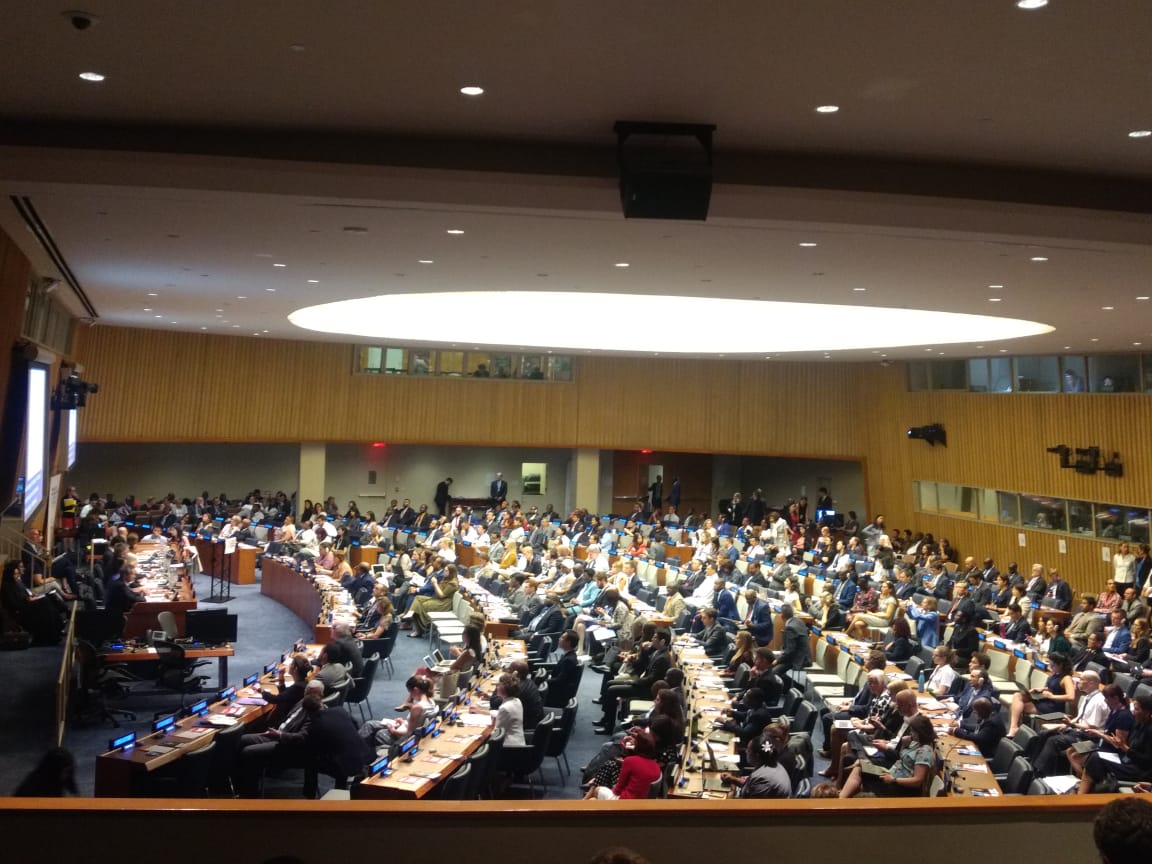
SDG 4 Review of Chile and Guatemala at the UN
July 17, 2019At the UN High-Level Political Forum, the platform to follow up SDGs across the world, Chile and Guatemala presented their voluntary national reviews about the implementation of this agenda. Four countries from Latin America and the Caribbean volunteered to participate in the 2019 review, reporting the actions taken for the achievement of the SDGs: Chile, Guatemala, Brazil and El Salvador. However, on the eve of the High-Level Political Forum, the last two countries announced that they would not participate in the review.
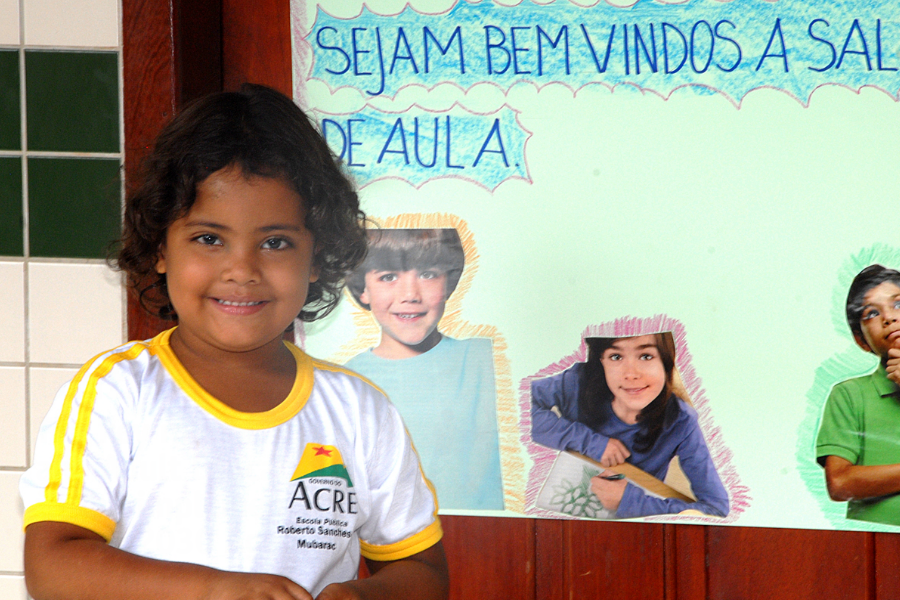
Brazil: Government tries to repeal mechanism that establishes minimum funding needed to ensure quality education
March 28, 2019By calling an extraordinary and secret meeting of the National Education Council for the afternoon of last Tuesday, March 26, the Brazilian government tried to repeal the “CAQ” (Cost student quality) and the “CAQUi” (Initial cost student quality), mechanisms of the National Education Plan that translate into values how much the country should invest per student per year, in each stage of public education, to insure a quality education (more…)
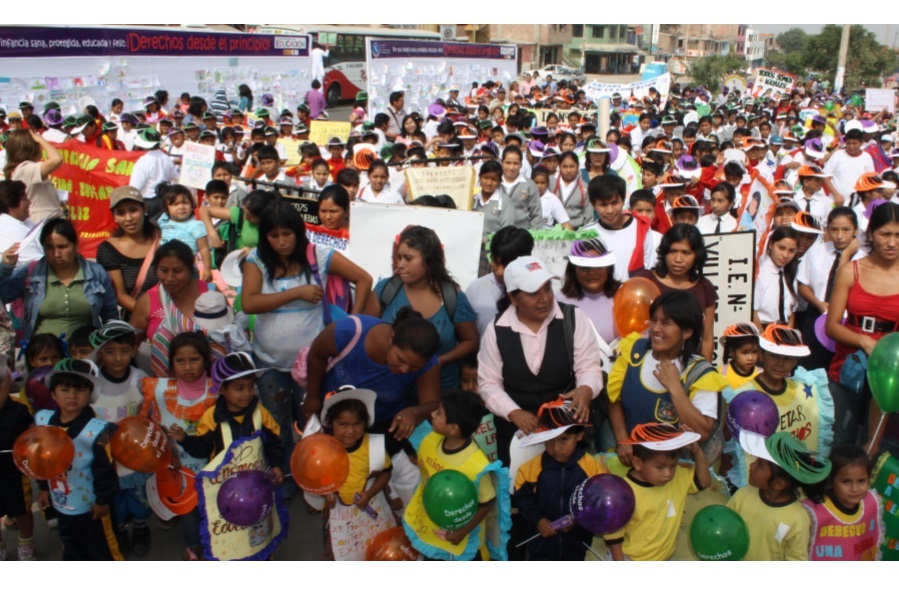
Madeleine Zúñiga: “Great inequality in access and quality is still the challenge of education in Peru”
February 27, 2019Advances, challenges and priority actions in the struggle for the right to education in Peru in 2019 are some of the topics that were discussed in an interview with Madeleine Zúñiga, national coordinator of the Peruvian Campaign for Education.
(more…)
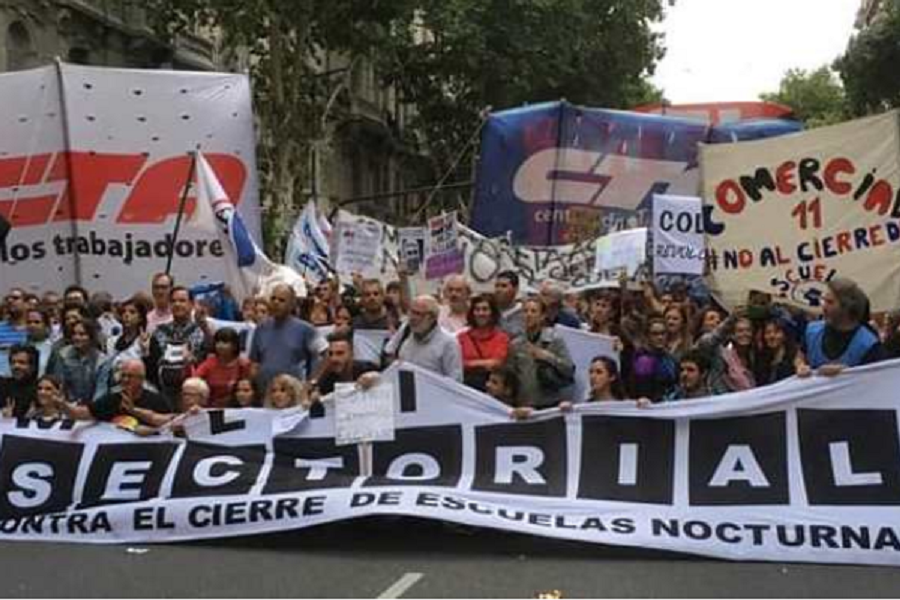
Argentina: Educational communities in Buenos Aires succeed in canceling the closure of evening public schools
February 12, 2019Students, education workers, and the Argentinian coalition CADE celebrate the result of their fight against a resolution of the city’s Ministry of Education, which had established the closure of public schools
(more…)
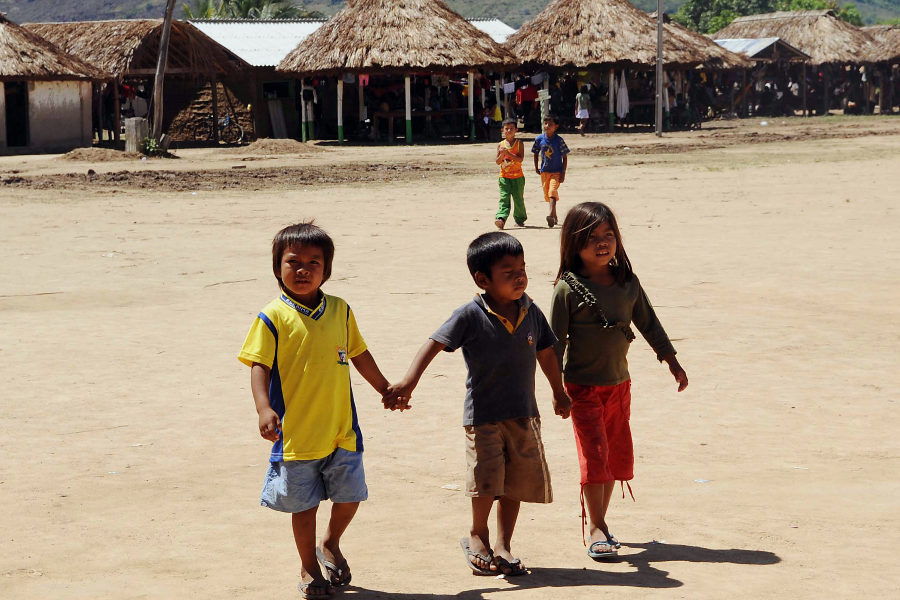
G20 and education: CLADE’s fight for adequate resources for this right
February 7, 2019Activists from Latin America and the Caribbean promoted actions of advocacy, mobilization and communication in the context of the G20, making the world’s largest economies recognize education as an essential human right to promote development with inclusion, prosperity and peace (more…)





